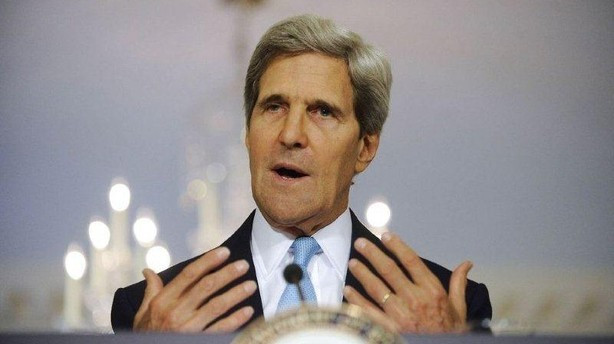Syria: Victims' Hair and Blood Show Traces of Sarin Gas, Says Kerry

Hair and blood samples taken from the victims of the chemical weapons attack on rebel-held areas of Damascus contain traces of the nerve gas sarin, US Secretary of State John Kerry said on Sunday.
Kerry said federal officials had received test results for the first victims to give samples after the attack on suburbs of the Syrian capital on 21 August, in which more than 1,400 people are believed to have been killed.
Speaking the day after President Barack Obama said he would seek the backing of Congress to commence air strikes against regime targets, Kerry told US network NBC's Meet the Press: "In the last 24 hours, we have learned through samples that were provided to the United States that have now been tested from first responders in east Damascus, and hair samples and blood samples have tested positive for signatures of sarin.
"The case hasn't changed and the case doesn't change at all. This case is building and this case will build."
Kerry said his information was not based on tests conducted by UN weapons inspectors who had visited Syria. "No, it is independent," he said. "But it is confirmation of the signatures of sarin."
He said the information only came to his attention in the last 24 hours.
Kerry said he was confident Obama would secure Congressional backing for a military strike, but added the president had the authority to act alone.
"The people of America should be celebrating that the president is not acting unilaterally," he said. "The president believes that we are all stronger as a nation when we act together."
'Hesitant and confused'
His comments met with defiance from the Syrian regime. Following a meeting with Iranian officials on Sunday, Syrian state TV quoted President Bashar al-Assad as saying his country was capable of confronting any attack.
"Syria ... is capable of confronting any external aggression," Assad was quoted saying. "The American threats of launching an attack against Syria will not discourage Syria away from its principles... or its fight against terrorism supported by some regional and Western countries, first and foremost the United States of America."
High-level regime figures had earlier accused Obama of weakness, with one saying his decision to seek the backing of Congress showed he was "hesitant and confused".
Deputy foreign minister Faisal Muqdad said: "President Obama was clearly hesitant, disappointed and confused when he spoke yesterday."
The regime had earlier labelled Obama's move as "the start of the historic American retreat".
A front-page editorial in the government daily Al-Thawra said Obama's reluctance to carry out strikes arose from his "sense of implicit defeat and the disappearance of his allies".
Obama feared any intervention could turn into "an open war", Al-Thawra said, which had "pushed him to seek Congress's consent".
Al-Thawra editorials have consistently reflected the thinking of President Bashar al-Assad's regime.
Syria's Prime Minister Wael al-Halqi had earlier struck a defiant pose, saying ahead of Obama's address that his country had its "finger on the trigger" and was braced for US strikes
"The Syrian army is fully ready, its finger on the trigger to face any challenge or scenario that they want to carry out," said al-Halqi.
Obama's decision to seek political cover for the intervention follows the surprise parliamentary defeat of the British Prime Minister David Cameron's government in supporting armed intervention.
Britain's chancellor, George Osborne, ruled out any attempt by Cameron to reverse the decision, which ruled out British participation in an attack.
"We can't take military action because parliament has spoken and the public is sceptical," Osborne said on Sunday. "I don't think more evidence and another week would convince the [sceptics]."
Any military intervention by the US will not now take place before Congress convenes to debate the action on 9 September.
READ MORE:
Assad regime brands US delay 'part of historic retreat'
Israel divided on Assad's likely reaction to US attack
Rebel groups like al-Qaida behind attacks, not Assad, says former presidential adviser Buchanan
Vladimir Putin rubbishes US Syria claims
© Copyright IBTimes 2025. All rights reserved.




















